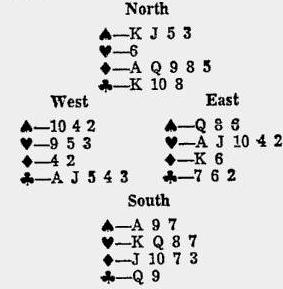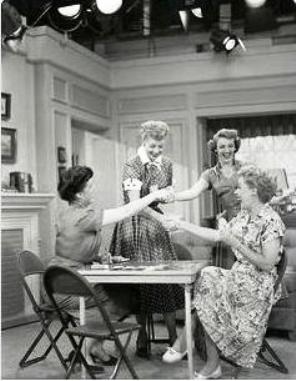Reading Eagle – Jul 29, 1951
The verb “duck” when used in the intransitive sense, means to dip or dive, or to duck the head. Its use in bridge implies the avoidance or evasion of or the deliberate attempt to lose a trick. It is very similar to the play known an the “hold up.” The objective of the ‘duck” is to establish a suit of your own while retaining an entry to the set-up suit, whereas the “hold up” is used to exhaust one opponent of his partner’s suit so that he cannot, when he gains entry, lead that particular suit. You may have a suit of five to the Ace in dummy, with no entry other than the Ace of this suit. If YOU have three low cards of the suit in your hand, the procedure is —as every player knows—to duck twice. If the adverse cards are divided three-two, you will eventually score three tricks in the suit. Should you have the Queen in the long hand with the Ace, the correct play is to duck once and finesse the second time, if necessary. There are numerous other situations which must be properly understood, if one wishes to make the most of this play.
The duck may he used as a defensive weapon just as often as it is used offensively. There are occasions where declarer will attempt a ducking play, and the opposition can frustrate the purpose by following the same procedure. And, again, there are times when the declarer is most desirous to have the opposition duck a trick which will permit him to cash the necessary number before the opponents awake to the strategy. In today’s deal a not unusual no trump situation, several interesting developments occur. With North the dealer, and neither side vulnerable, South be came the declarer at 3NT.
Here is the hand distribution:

| West | North | East | South |
| 1 |
1 |
2NT | |
| Pass | 3NT | All Pass |
West led his fourth highest club, with dummy playing the eight spot and South holding the trick with the nine. Most declarers will immediately lead the diamond Jack, the finesse losing to East’s King. East will there upon return a club, declarer playing the Queen. At this point an experienced defensive player will refuse to win this trick, thereby employing the duck. West must hold up so that if East regains the lead just once more, a club return will score three tricks in that suit and probably defeat the contract.
Where the West player refused to overtake the Queen, the contract was defeated. Declarer can score four diamonds and two spades, which in addition to his previously made two clubs will add up to eight tricks. However, when he attempts either the spade finesse or a heart play for his ninth trick East will win and return the club to defeat the game contract. Therefore, a careful and imaginative dealer will not attempt to make the contract by the method outlined above.
South must realize that East, who has overcalled on the first round of the auction probably holds the spade Queen and the diamond King in order to justify his bid. West, no doubt, holds five clubs to the Ace-Jack, as will be made clear when East falls to go up on the first trick. Therefore, South must realize that the diamond finesse will fail, and a club return will follow—which if ducked by East will defeat the contract.
So South plays the ten spot to the first trick, so that if East cannot overtake, dummy will be on lead. The ten holds, and now the singleton heart is led from dummy. If East fails to go up with his Ace, South will win this trick with his Queen, and nothing can prevent him from making his contract. He will immediately finesse the diamond, and when East returns the club it makes no difference what West does. South will win four diamonds, two clubs, two spades and the heart for high nine tricks. By this method South has inveigled East into ducking a trick whereas he must go right up with his heart Ace if he hopes to defeat the game.
If we assume that East is equally alert to the situation and does score his heart Ace at trick two, how should declarer play to give himself a chance to make the contract? With East returning the club, South’s best chance is to let West run his clubs. If West fails to overtake the Queen, declarer must overtake with his King m dummy and return the last club on which he must throw a diamond from his own hand. When West cashes his two remaining clubs, two small diamonds are thrown from dummy, while East must protect his diamond King and spade Queen—thus being forced to pitch two of his remaining four hearts. Declarer, who is guided by East’s discards throws one more diamond and one spade.
West must now lead either spade, heart or a diamond. Regardless of his return South can make his contract. The natural lead for West is a diamond, as he most figure that his partner holds the missing King, otherwise declarer would have gone after that suit. Dummy wins with the Ace, enters the closed hand via the spade Ace and cashes the three heart tricks—pitching the two remaining diamonds and a small spade from dummy. On the third heart East is squeezed, for if he pitches the diamond King declarers Jack is good, and if he throws a spade then the King-Jack of that suit are good in dummy. It will pay almost any player to lay out his hand and follow it through to the various conclusions.
Esta entrada también está disponible en: Spanish

